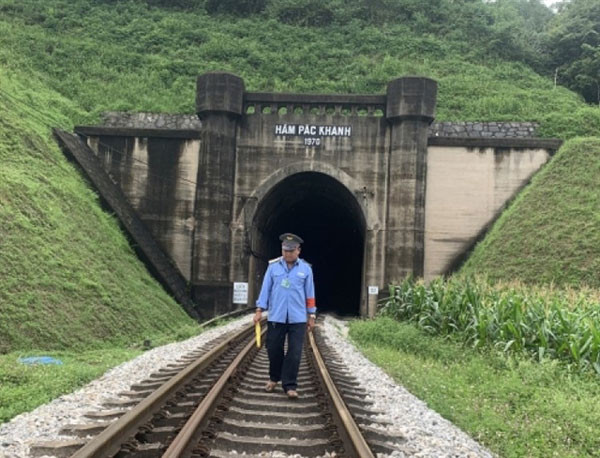
Every morning from 5:30am, Tran Van Tam, a railway worker, parks his bike at a local residence near National Expressway 1A and walks the path to his guard station.
It's a small two-kilometre-long path, and it's even harder to tread when the rain comes. The "breathtaking" journey ends when the small yellow house of the guard station appears.
Where Tam works, Pac Khanh Tunnel in Van Thuy, Chi Lang, Lang Son, is one of the longest railway tunnels in Vietnam, with a length of 1,069 metres.
Tam's job is to inspect and ensure the technical aspects of the rails and the tunnel and quickly detect anomalies on the route. Pre- and post- train trips, Tam must check all concrete bars, rails and communication systems.
As his family lives far from the station, the 30 years of being a railway worker are also 30 years of living in the jungle for Tam, where clean water is not available and where lunch is either a cold box of rice or a cup of noodles.
"Although the difficulties are there, it has been improving a lot compared to the past," said Tam.
"I had to bring clean water from home or borrow from nearby locals. This job needs a great deal of passion, and for us, the will is to put safety first. Being a railway worker means no alcohol or sleeping on the job, and I must know the shifts and arrival times."
"When our shifts come, it's up to us to do whatever it takes for the train rides to be safe."
It's difficult for workers like Tam, working in the middle of nowhere with a lack of equipment, but railway workers in the city like Trieu Thi Hang also had to deal with many problems, with a job many think of as easy.
"As a parent with children, sometimes it's hard for me working night shifts compared to my male colleagues," said Hang. "But it's my choice, and it's the choice I love, to be able to ensure safety for train rides here."
According to Tran Trong Doan, Technical Safety Team No.3 Team Leader of Ha - Lang Railway Company, there are currently 120 railway workers working on the Hanoi - Dong Dang route.
"It's a very difficult job because they must work day and night, no matter the weather, with no holidays. Many guarding stations are far from urban areas. The salary is not much and ranges from VND4-6 million (US$170-256), so our company also tries to give out bonuses and compensatory leave for the workers," said Doan.
"The company always cares about our workers, especially those working in difficult areas. We also regularly check and improve our guard station equipment to improve workers' duties. Through the Youth Union, we are also taking care of workers' mental health, encouraging them to give their best to the job and, ultimately, for the safety of all train journeys."
Decades of working in the railway industry have left the sound of the train whistle, the smell of oil and the images of passengers happily waving on the trains in the railway workers' minds. Perhaps those memories are a great reward for the railway worker in and of itself.
Source: Vietnam News